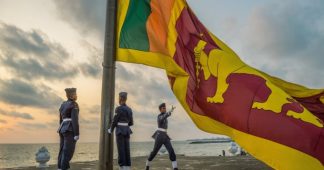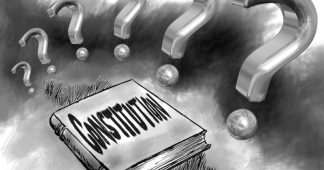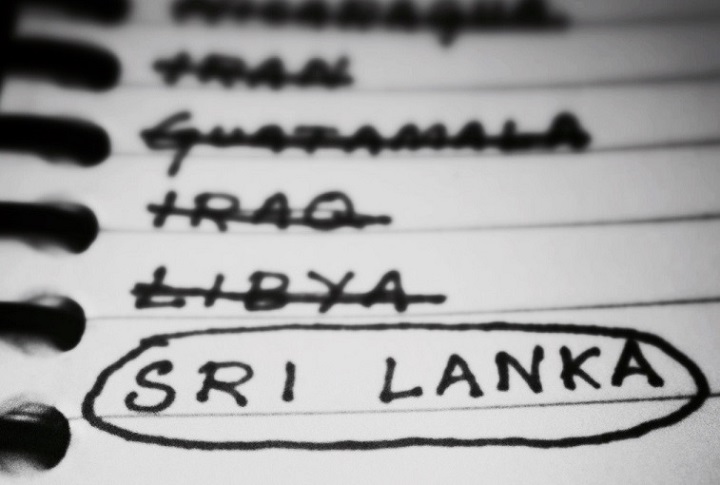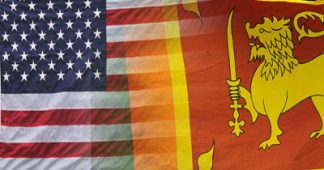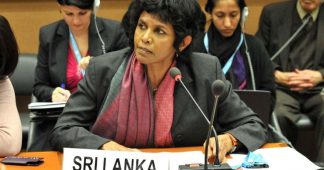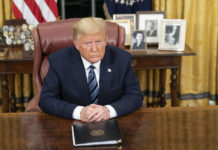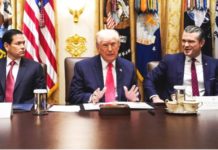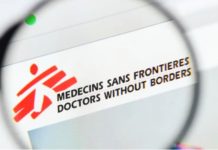Sri Lankan sovereignty, non negotiable!
An intellectually inspired Sri Lanka
Viyathmaga Workshop on International Relations
Colombo, 13 May 2018
by Tamara Kunanayakam
Sri Lankan sovereignty, its supremacy in domestic policy and independence in foreign policy, is under a two-pronged attack:
- At the UN Human Rights Council, the attack is led by US neoconservatives who aggressively promote direct, unilateral, preventive, and pre-emptive intervention, including military, in the internal affairs of sovereign States;
- Within Sri Lanka, their ideological counterparts, the neoliberals, lead the attack on the economic front.
In Geneva, the pretext is alleged war crimes; in Sri Lanka, bad governance and corruption.
The neoconservative attack in Geneva functions as a threat; what could happen if Sri Lanka fails to implement Washington’s wide-ranging diktats in the Human Rights Council resolution. Within Sri Lanka, the neoliberal attack is happening, it is in progress, and is accelerating under our very noses.
They have a common enemy: State sovereignty.
Human Rights Council resolution 30/1, led by Washington and co-signed by the Yahapalana partners, gives legitimacy to Washington’s unilateral intervention in Sri Lanka and permits instrumentalisation of the UN Office of the High Commissioner for Human Rights to draft the laws necessary to permit the physical take over of territory, including the natural wealth and resources it contains, which is what is meant by “rule of law” or “good governance.” On the ground, meanwhile, Western aid agencies, think tanks and corporations shape, draft and help implement policies, opening “new frontiers” for US hegemony.
My focus today will be on the ongoing assault on the very substance of our sovereignty and independence – the right of our people to possess and use their natural wealth and resources in their national interest and for their own wellbeing. Without this, there can be no independent domestic policy and no independent foreign policy. Without this, independence, sovereignty, and democracy are but empty shells.
Sri Lanka is fast losing its economic sovereignty. The situation is qualitatively worse than being caught in a debt trap. Under Yahapalana, policy choices and their implementation have been ceded to the US Administration, its ultraliberal think-tanks, and a small clique of legal and financial consultancy firms, including accounting firms, which are in the highly lucrative business worth millions of dollars of designing and implementing so-called bail-out programmes and privatisations. Lead corporate players both give advice on privatization and then profit from that advice. People and nation have become dispensable commodities; their labour, natural wealth and resources, public institutions, and even State enterprises, are on auction with foreign bidders determining their worth.
The Yahapalana partners are letting themselves be led by the nose by Washington down the path of neoliberalism, in spite of ample evidence exploding the myth of the private sector being more efficient than the public sector. The most important study on the efficiency of all European State enterprises privatized during 1980-2009, revealed that privatized companies performed worse than those that remained public.[1] This was true even in the extremely competitive telecommunications sector, where private sector performance was found to be “significantly worse.” [2]
A 2015 UNDP study found no model of ownership (public, private, or mixed) is intrinsically more efficient than the others. The report reveals how, in recent decades, efforts to undermine the effective, efficient and equitable public official working for the common good have advanced on seven fronts : ideological, intellectual, commercial, political, financial, institutional, and organisational. [3] In fact, the trend in Europe is for cities to reclaim public services from the private sector in areas such as water, transportation, electricity, garbage collection, etc.[4]
The case of British Metronet Rail, a PPP that included the maintenance of trains, tracks, stations, signals, etc. is very telling. In the last year of a 5-year deal, Metronet became insolvent and was taken under management of a court appointed administrator, costing the public over £400 million. In reviewing the PPP in 2008, the UK House of Commons Transport Committee concluded, “the Metronet contract did nothing more than secure loans, 95% of which were in any case underwritten by the public purse, at an inflated cost … Metronet’s inability to operate efficiently or economically proves that the private sector can fail to deliver on a spectacular scale.” The Committee also concluded that the lessons learned went to the heart of the myth about private sector efficiency: “We are inclined to the view that the model itself was flawed and probably inferior to traditional public-sector management. We can be more confident in this conclusion now that the potential for inefficiency and failure in the private sector has been so clearly demonstrated. In comparison, whatever the potential inefficiencies of the public sector, proper public scrutiny and the opportunity of meaningful control is likely to provide superior value for money. Crucially, it also offers protection from catastrophic failure. It is worth remembering that when private companies fail to deliver on large public projects they can walk away—the taxpayer is inevitably forced to pick up the pieces.” [5]
Privatisation itself is a big industry. Key players elsewhere and in Sri Lanka include the ‘Big Four’ accountancy firms, Deloitte, PriceWaterhouseCoopers, KPMG, and Ernst & Young. Not only is limiting sovereignty their ultimate objective, the process itself of formulating policy, decision-making, and implementing is under their direct control. In the medium term, their policies and measures will result in the disappearance of Sri Lanka as an independent State.
My initial aim was to address all of the above, but because of the complex, devious, and murky ways in which they work on this destructive enterprise, my intervention will be limited to the role played in policy making by neoliberal think tanks, Washington, and their corporate backers.
I have discovered that what is visible is not just the tip of the iceberg, but far, far less, and even that is so enormous that I can only attempt to share a minute part of it with you. I hope, however, that it will be enough to motivate all Sri Lankan patriots to pool together their efforts, for only then can the bigger picture emerge and an appropriate repost be articulated.
The role played by the Yahapalana partners in this onslaught is not a matter of bad management, bad governance, incompetence, incapacity, or the absence of vision. They have been placed in the positions they occupy precisely because of a shared vision with the neoliberals, and their ability to deliver to their foreign masters at a vertiginous speed, selling on their behalf anything and everything that can be sold – and cheaply, and their ability to earn profits for their masters and themselves at an equally vertiginous speed. And, all this is at the expense of the vast majority of the Sri Lankan people, irrespective of their culture, ethnic origin, religion or geographic location.
- The neoliberal project
So what is this neoliberal project? What are its origins? Who are its members?
Has anybody here heard of the Mont Pelerin Society?
The neoliberal project has its origins in The Mont Pelerin Society, which is a secretive and shadowy organization founded in 1947 by Friedrich Hayek, along with Milton Friedman, other neoliberals, big business and members of the oligarchy.
Its vision is a minimal State whose only purpose is to protect private property and the so-called free-markets by putting in place laws and policies that favour the ultra-rich. It must abdicate responsibility for social wellbeing, including employment, health care, education and even national defense. The State, in which popular sovereignty is vested, will thus be transformed from an entity duty bound to represent the interests of people and nation, to an entity that guarantees the interests of a small oligarchy. It is for these same reasons that the Mont Pelerin Society relentlessly combat the decolonization process, and the recognition by the United Nations of the right of former colonies to enjoy permanent sovereignty over their natural wealth and resources.
The Mont Pelerin Society’s main preoccupation is how to counter popular opposition. Despite intimidating those in favour of State involvement by equating “big government” with totalitarianism, the most discussed solution within the Society is imposition of constitutional limits to popular power through policies and laws that will enable a limited, but strong State, to combat inevitable opposition by the masses. This is what is meant by “rule of law” in the Human Rights Council resolution 30/1 against Sri Lanka and in the ‘Good Governance’ conditionalities of Western Governments and their financial institutions.
Fernando Schüler, an academic and columnist connected to the Mont Pelerin Society’s Atlas Network In Brazil, called for the repeal of the law making voting compulsory and withdrawal of support for trade unions. His argument is that organizations are no longer necessary, because people can now “participate” and “organise” themselves, on their own, using low cost technology such as WhatsApp, Facebook, YouTube, etc. Prime Minister Ranil Wickramasinghe’s promise to provide free public Wi-fi facilities in each village by the end of 2018 is coherent with this view.
Another commonly encountered political strategy to counter resistance was formulated by the German economist, Herbert Giersch, a President of the Mont Pelerin Society, which he called the “Diktat of empty coffers,” whereby Government spending is cut indirectly by ensuring that less money goes to it in the first place, achieved through privatization and tax cuts.
Since its establishment, the Society’s members have created more than five hundred think tanks around the world, in addition to academic institutions and University economics departments, to aggressively advance the neoliberal project under cover of such supposedly impartial hubs of expertise.
It is the Mont Pelerin Society that inspired the destructive policies against the State by political leaders such as Ronald Reagan in the US, Margaret Thatcher in the UK and General Pinochet in Chile. The same policies are imposed on indebted Third World countries by the Washington-based financial institutions – the IMF, World Bank and the US Treasury. With the 2008 global financial crisis, they have become more widely imposed even in the West.
Today, the global influence of the Mont Pelerin Society in State policy has become so overwhelming that only 6 months ago, in November 2017, the public German TV channel, ZDF, broadcast a special programme, “The Mont Pelerin Society and the network of neoliberal think tanks from 1947 until today,” exposing a cobweb of organisations linked to the Society and denouncing its anti-State, anti-popular policies.
Did you know an eminent Sri Lankan is a member of the Mont Pelerin Society?
Yes, it is none other than Prime Minister Ranil Wickramasinghe! In fact, a Special Meeting of the Society was held in Sri Lanka in 2004 under his influence, when he was Prime Minister. And, there are others…
- Neoliberal think-tanks in Sri Lanka
In Sri Lanka, neoliberal think tanks are profoundly influencing the policy changes and far-reaching reforms underway, including drafting of the new Constitution.
I will focus on the two most visible – the Institute for Policy Studies and Advocata Institute – to expose the devious and deceitful ways in which the Mont Pelerin Society is implementing its anti-people anti-State Agenda in Sri Lanka, and how it has penetrated the centre of Sri Lankan State power, determining government policy, masquerading under the guise of impartiality.
- Institute for Policy Studies (IPS)
The case of IPS, which is Sri Lanka’s main economic policy think-tank is a classic example of how Western governments and their neoconservative and neoliberal think-tanks function together to hijack State sovereignty in other countries. It shows how such foreign-funded, foreign-controlled entities not in any way accountable to Sri Lanka’s democratic institutions penetrate Government institutions and work from within – without any impediment – to implement an alien agenda, and in the most deceitful of ways.
IPS claims it is “independent,” but it is independent only from the institutions of the Sri Lanka State, but dependent on Western States, their oligarchs, and their capital.
When an Act of Parliament established IPS in 1988, it was located within the Ministry of Finance and Planning, but co-financed by the Dutch Government and run by a Resident Coordinator from the Dutch Institute for Social Studies (ISS), an Institute founded by the Dutch Government to train intellectuals and policy makers, especially from the former Dutch colonies.
In 2006, IPS announced it had set up its own Endowment Fund and was moving to full financial independence, but it simultaneously signed an agreement with the Dutch Government for financing the construction of a new office building outside the Financial and Planning Ministry.
Today, it claims it is autonomous, but has only expanded its list of direct and indirect donors from the West to include, in addition to the Netherlands, new Western Governments – Canada, UK and Norway – as well as US corporations, banks and equity funds, channeled through the Hewlett Foundation and the Bill & Melinda Gates Foundation. These funds reach IPS for financing its core activities via The Think Tank Initiative, a project launched and managed by the Canadian government-owned International Development Research Centre (IDRC) to effect policy changes in the Third World through the promotion of think tanks in those countries.
IPS is among the most direct channels through which the anti-State ultraliberal Mont Pelerin Society is engaged in Sri Lanka. Its Chairman, Sri Lankan born Professor Razeen Sally is a member of the Society. In 2011, he was awarded the Hayek Medal named after its founder. He is also Adjunct Scholar at the Cato Institute, the most prominent neoliberal think tank in the US, also founded by a Mont Pelerin member, Ed Crane, and Director of another Cato related think-tank, the European Centre for International Political Economy (ECIPE), an entity also connected to the neoconservative Brookings Institution with links to the CIA.
Razeen Sally and other Members of the Governing Board also hold key positions in Government. In July 2017, the Finance Minister Mangala Samaraweera appointed Sally as Senior Advisor. Indrajit Coomaraswamy is member of the IPS Board and also Governor of the Central Bank. Other IPS Board members include M.I.M. Rafeek, Secretary, Ministry of Policy Planning and Economic Affairs, and S.S. Mudalige, Director General, National Planning Department.
Connected to the apex of State power is IPS Governing Board Member Sarath Rajapathirana, who is Economic Advisor to President Sirisena. His presence beside the President shows the extent to which the State has been penetrated by US neoconservatives and neoliberals. It is noteworthy that Rajapathirana is Visiting Emeritus Scholar at the neoconservative American Enterprise Institute. During the George W. Bush Administration, the Institute was regarded as the “intellectual command post of the neoconservative campaign for regime change in Iraq.”
IPS is in the business of aggressively promoting the sale of public assets and privatization of all State owned Enterprises, including public utilities. Advocata Institute, another influential Mont Pelerin Society think tank in Sri Lanka with which Sally has close links, published an interview with him in its report, The State of State Enterprises in Sri Lanka. In that interview, Sally declared that the “first best solution to the running of SOEs in Sri Lanka is to have a timetable to privatize.” To combat democratic opposition, he proposed an insidious strategy of deceit – begin with partial privatization by putting into a holding company all public enterprises that operate in a commercial sphere, including SriLankan Airlines, Mihin Air, Sri Lanka Transport Board (SLTB), telecommunications, among others, and then, as the next step, “gradually” increase private sector stakes until “the time is right politically” to move into majority private ownership.
With regard to public utilities such as water, electricity, petroleum, and others, Sally recommended replacement of Board members of the Public Utilities Commission with so-called “independent directors.” By “independent,” Sally meant foreign; according to him, “having independent anybody in Sri Lanka is very difficult at the moment.”[6]
In fact, Razeen Sally and his IPS are in the business of advancing Washington’s strategy of containing and rolling back China. At a forum organised by Advocata in 2017, he argued that trade and investment in services and industry must be further liberalized to attract investments from the West and India, because, otherwise, “Sri Lanka could become over-dependent on Chinese investments by state firms.” His comment is coherent with the 2018 US National Defense Strategy, which considers “the reemergence of long-term, strategic competition” by China and Russia as the central challenge to US prosperity and security, not terrorism.
The 2018 US National Defense Strategy calls for the “seamless integration of multiple elements of national power — diplomacy, information, economics, finance, intelligence, law enforcement, and military.” The approach combines the actions of the Defense Department with that of the Departments of State, Treasury, Commerce, USAID, Energy, Justice, the CIA, the FBI, and others.
- Advocata Institute
Another influential Colombo-based neoliberal think-tank actively identifying key areas for reform, promoting free market, challenging the efficacy of State-owned enterprises, and aggressively engaged in their dismantling, is Advocata Institute, also known as Advocata. Like IPS, it is connected to the Mont Pelerin Society, and also to the US Administration.
Advocata was launched in May 2016 at the Lakshman Kadirgamar Institute with, as Chief Guest, the then Deputy Minister of Public Enterprise Development Eran Wickramaratne, today State Minister of Finance. Its inaugural report, The State of State Enterprises, which was also launched at the event, claimed there were 55 strategically important State-owned Enterprises that had made enormous losses between 2006 and 2015. It argued that reform should not be limited to loss-making SOEs, and called on the Government to conduct a comprehensive productivity study so that it can determine which to shut down, which to privatise and which to hold under a government holding company.
It is noteworthy that Advocata’s report and its recommendations were drafted before the institution itself existed!
In August of that year, only 3 months after the still “unknown” Advocata was launched, the Minister of Development Strategies and Trade, Malik Samarawickrama, quoted it’s findings to announce “far-reaching privatisation plans” by the Government to maximize profits for the private sector. The ongoing liberalization of trade, investment and finance all indicate that by “private sector,” the Minister meant foreign not domestic capital.
The Minister’s statement was interpreted by Atlas Network, to which Advocata belongs, as commitment that the Government “is ready to go the whole hog” in privatizing strategic as well as non-strategic SOEs despite “the immense political risk.” As you know, “to go the whole hog” means “to do a thing thoroughly or completely, to commit one’s self to anything unreservedly.” That precisely is what the Yahapalana partners did in Geneva, “go the whole hog!” [7]
Atlas also claimed that the privatization of SOEs was a move “spurred” by its partner Advocata, which, it said, “has been widely influential in this ongoing reform process,” and is “helping to change things.”[8] A year later, in December 2017, Atlas listed Sri Lanka among 10 countries where it said it had “invested successfully” and won, claiming that Advocata’s report had become the Government’s “go-to reference on the topic,” which had given “the final push needed to get the government to put the struggling business up for sale.” The reference was to the Government decision to privatize SriLankan Airlines.[9]
In September, a month after the Minister’s announcement, Cabinet approved a proposal by the Prime Minister to hire the US firm, McKinsey and Company for US$ 2,3 million to establish a Central Program Management Unit in his Office for “accelerated economic transformation” to monitor projects fast-tracked under a wide ranging new Development (Special Provisions) Bill that will give sweeping powers to restructure and transform the economy. The Unit would build cooperation between the Prime Minister’s Office and the Ministry for Development Strategies and Trade, headed by his close confidante Malik Samarawickrama. The Prime Minister proposed that Nika Gilauri, a former Prime Minister of Georgia under the pro-Washington, ultraliberal regime, be among senior experts on the project.
In November 2016, Advocata submitted recommendations for Budget 2017 to the Ministry of Finance and Planning, including so-called “reactivation” of State-held lands, which it named “Dead Capital.” It was referring to the some 987,000 acres vested in the Land Reform Commission, which included what it described as “prime real estate blocks” in major cities like Colombo occupied by schools, government ministries, and other facilities, which, according to it, “greatly outweighs their economic value.”
Machiavellically, Advocata’s plans for foreign takeover include fixed assets such as land and buildings currently occupied by the military, a measure, it says, must be achieved through a national plan to downsize the military.
As an initial step, Advocata recommended accounting property rents at market values to get an accurate sense of the value of the “dead capital” occupied by the State. It also recommended a Land Asset Sales Programme “to dispose of surplus or underutilised land,” which must, it insisted, be run by “an independent body free of political influence to minimise corruption.”
It is likely that it is this highly controversial neoliberal doctrine of “Dead Capital” that influenced Yahapalana’s decision to remove at least half of some 50,000 slums within the Colombo City limits by year 2020. Megapolis and Western Development Minister Champika Ranawaka made the announcement in August 2017. According to a government official, the plan is to go for a 99-year lease with an investment of at least Rs.1.92 billion per acre.
In October 2017, when the 2018 Budget was still being drafted, Advocata organized a forum to identify a series of areas for reform, in partnership with Atlas Network and Canada’s Fraser Insitute, both of them founded by Antony Fisher. The forum brought together members of government, industry, academia and think tanks, and coincided with the release of the Fraser Institute’s annual Economic Freedom of the World Report in which Sri Lanka is given a low ranking. Among the principal reasons given was “weaknesses in the legal system and property rights.”
Yahapalana’s 2018 Budget responds to the preoccupations of the neoliberal think tanks. It has several proposals to integrate ocean-related activities, liberalise land and shipping, including removal of restrictions on foreign ownership of land, shipping and freight forwarding businesses, and the establishment of a one-stop Public Private Partnership (PPP) unit for designing and implementing PPPs.
In February 2018, a delegation from the US-based financial advisory and asset management firm, Lazard, visited Sri Lanka to discuss how it could help divest and attract foreign investments. According to William Cohan, a former Lazard banker, public sector advisory services is “a very high-margin business… All their expenses are paid, and they have no capital at risk. This is as sweet as it gets.” When contracted as privatization advisor, Lazard not only involves its advisory services branch, but also its asset management branch. On a number of occasions, Lazard has undervalued the price of a company, so that its asset management branch can buy up the stock at low prices and sell it for a considerable profit, as it did with Royal Mail in the UK and Airports and Air Traffic Management in Spain.
Advocata’s connections to the US Administration and the Mont Pelerin Society are direct as well as indirect.
To start with, Number One on its Board is Franklin Lavin, who served as Reagan’s Political Director and Deputy Executive Secretary on his National Security Council Staff under National Security Advisers Carlucci, a former Deputy Director of the CIA, and Colin Powell.
On the Board is an influential Mont Pelerin Society member: Prof Suri Ratnapala. Prof. Ratnapala is also on the panel of intellectuals appointed by the Prime Minister to advise the Steering Committee and sub-committees drafting the new Constitution. Mont Pelerin Society member, the Prime Minister, chairs the Steering Committee. Given the influence of neoliberals on the Committee, the minimal State in the proposed Constitution should come as no surprise! The removal of executive powers of the President, devolution of powers and reforms to the electoral process, are some of the key highlights of the new draft.
Other members of the Advocata team directly or indirectly linked to the Mont Pelerin Society are Chris Lingle, a senior Visiting Professor of Economics at Advocata, and Fredrik Erixon, founder of the European Centre for International Political Economy (ECIPE). The Co-founder and Director of the Centre is none other than IPS Chairman, Razeen Sally.
Advocata is part of Washington-based Atlas Network, a neoliberal anti-State network of nearly 500 organizations in more than 90 countries, which was founded by Antony Fisher, a member of the Mont Pelerin Society and a strong critic of “statism.” According to a Fisher associate, his mission was to “litter the world with free-market think tanks.” Fisher was also the founder of the Institute of Economic Affairs, which wrote speeches and policy papers for Margaret Thatcher, and confronted her critics in the media. After her 1979 election victory, Thatcher wrote to Fisher that his Institute had created “the climate of opinion which made our victory possible.”
Unlike traditional think tanks, which focus on genuinely new policy proposals, the Atlas model is part of a strategy for mass persuasion. With the global rise of opposition to free-market policies, its focus is to multiply political organisations under cover of academic institutions to give them credibility, thus making them effective tools to repackage neoliberalism as a public interest ideology.
The Atlas Network functions as an extension of US foreign policy and has been involved in regime change and destabilisation in Latin America, and elsewhere. In Honduras, it played an important role the military coup against Manuel Zelaya, who promoted pro-poor and nationalisation programmes; in Argentina, it helped topple Cristina Kirchner who was indicted for corruption and helped bring a real-estate baron to power; In Venezuela, it supported the short-lived military coup against President Chavez in 2002 and the protests against his successor, Nicholás Maduro. In Brazil, its think tanks, which had grown from 3 to almost 30 between 2007 and 2017, succeeded in diverting public anger against leading politicians of all major political parties involved in a bribery scandal known as Operation Car Wash, to focus on President Dilma Roussef and the social welfare policies of her Workers’ Party, leading to her impeachment in 2016.[10]
The US State Department and National Endowment for Democracy (NED) discretely finance think tanks associated with Atlas Network. Judy Shelton, a senior fellow at Atlas Network and an adviser to the Trump Presidential campaign, chairs the NED. The corporate world is an important source of its funding and include the Koch Foundation owned by the Koch brothers, two of world’s richest people, whose total fortune is estimated at US$ 82 billion and who are known for their use of huge sums to influence elections and legislation; the Bradley Foundation, one of the largest right wing foundations, whose highly politicized agenda includes dismantling and defunding unions; the John Templeton Foundation, which aims at encouraging integration of religious beliefs and free-market principles into the classroom; Donors Trust, the Heritage Foundation, the Cato Institute, in addition to direct corporate funding, for instance, from ExxonMobil, Philip Morris, and MasterCard.
III. Millenium Challenge Corporation (MCC):
US Government in the Prime Minister’s Office
The US Government and US capital do not only rely on their think tanks to create a favourable climate for ownership and control over Sri Lanka’s territory. The Millennium Challenge Corporation (MCC), which claims to be “independent,” but is a US government body chaired by the US Secretary of State, has a Project Unit physically located inside the Prime Minister’s Office within its strategic Policy Development Unit.
Given its strategic location in the Prime Minister’s Office, it is a legitimate to ask whether and to what extent the Corporation is involved in shaping the country’s economic and trade policy, and also in drafting the Prime Minister’s eight-year economic development plan “Vision 2025” that was unveiled in September 2017, some 5 months after MCC set up office.
The Corporation’s stated aim is to deliver “smart” US foreign assistance to fight global poverty, a term coined by Joseph Nye and associated with Washington’s “smart power” strategy. Even though economic power is viewed as being “soft,” even Nye recognised in a 2006 Foreign Policy article that it cannot be, because it is “clearly intended to coerce” and is “thus a form of hard power.”
So called MCC “partnerships” are indeed based on coercion and prior implementation of political conditionality. The difference between traditional foreign aid conditionality and MCC funding is that while traditional aid is based on actual “good governance” results, MCC funding depends on the demonstration that it has been achieved. By Good Governance (or Yahapalana, in the Sinhala) is meant reforms considered necessary by the US agency to protect private foreign investors, meaning US capital, especially laws governing Public Private Partnerships.
Unlike traditional foreign aid, MCC assistance involves an annual re-selection process, which permits coercion on a permanent basis, depriving the State of space for sovereign decisions.
Moreover, the indicators it uses to measure performance are highly political themselves, determined by the IMF/ World Bank, Freedom House, the Heritage Foundation, and the Brookings Institutions, among others. Data on trade policy comes from the neoconservative ultraliberal think tank, The Heritage Foundation, a think tank that Mont Pelerin member, Ed Feulner, helped found and which has strong links to the CIA. Evaluating whether a State is “ruling justly” is done by Freedom House, which receives 80% of its income from the US Government and has carried out destabilization missions under the CIA against legitimately elected governments. Evaluating control of corruption, Government effectiveness, rule of law, and regulatory quality is conducted by the World Bank and the neoconservative think tank Brookings Institution, which has links to the CIA and supports Washington’s unilateral military interventions.
CONCLUSION
Whether we like it or not, Sri Lanka is fast losing its economic sovereignty. Yahapalana’s positions at the Human Rights Council and declarations show that we no longer enjoy political independence. The planned foreign takeover of fixed assets occupied by the armed forces will ensure that we will no longer be able to defend our territory. Today, Sri Lanka is being turned into an aircraft carrier for Washington’s undeclared war against China, and our people foot soldiers in the battlefront.
Yahapalana’s utter submission to US hegemony is reflected in its constant citation of acclamation from Washington as example of success. Only recently, President Sirisena told BBC that the new Ministers appointed must be acceptable to the international community, as well.
Under the circumstances, it is vital that we return to the principles upon which our sovereignty and independence is based. There is wide recognition in international law and policy that political independence of States can only be assured through economic independence, which in turn is only possible if people are able to exercise their right to own and develop – on a permanent basis – the wealth and natural resources found on their territory. Other States are duty bound to respect this inalienable right. Permanent sovereignty is crucial for the preservation of Sri Lanka as a fully independent State in which its people can exercise their inalienable right to self-determination.
The 1986 UN Declaration on the Right to Development recognises the widespread failure of the Western, neoliberal, free-market, foreign debt-dependent development model that is based on exports and economic growth, to achieve social progress and wellbeing for all. Hence, the Declaration calls for a development strategy that is based on social justice and equality, instead, in which people are the central subjects not objects of development, and which should be achieved through solidarity not competition. All other States are duty bound to respect this inalienable human right and right of peoples and to create the international conditions necessary for its realisation.
There is an undeclared, covert war against Sri Lanka taking place. It is conducted by a Holy Alliance between Yahapalana, the US Administration, the corporate world, including and especially finance, and their neoliberal think tanks.
The result will be more deadly than the almost 30-year-war against LTTE terror and separatism. If we fail to resist now, we will lose total control over our territory and our natural wealth and resources. Our national identity and culture will be dismantled, our ability to determine domestic policy and foreign policy will be lost, and along with it, our independence and sovereignty.
Let’s beware. Many things can be negotiated, but principles, never ! Sovereignty, independence, and territorial integrity are non-negotiable!
- PSIRU,Public and private sector efficiency, May 2014, tl/PSIRU-efficiency
[2] https://impact.vice.com/en_us/article/bjx543/european-cities-are-taking-back-public-services-from-private-companies
[3] UNDP, Is the private sector more efficient? A cautionary tale, The Global Centre for Public Service Excellence, UNDP, 2015. http://www.undp.org/content/dam/undp/library/capacity-development/English/Singapore%20Centre/GCPSE_Efficiency.pdf
[4] https://impact.vice.com/en_us/article/bjx543/european-cities-are-taking-back-public-services-from-private-companies
[5] Report of the UK House of Commons Transport Committee, January 2008, HMSO.
[6] [Note that the term “independent” is also used by the West to refer to foreign participation in a hybrid court.]
[7] https://www.atlasnetwork.org/news/article/reforming-and-privatizing-state-owned-enterprises-in-sri-lanka
[8] https://www.atlasnetwork.org/news/article/reforming-and-privatizing-state-owned-enterprises-in-sri-lanka
[9] See https://www.atlasnetwork.org/partners/global-directory/libertad-y-progreso ; and , https://www.atlasnetwork.org/news/article/ten-wins-in-ten-countries-how-atlas-networks-investments-in-economic-freedo
[10] Lee Fang, Sphere of influence: how American Libertarians are remaking Latin American politics, 9 August 2017, https://theintercept.com/2017/08/09/atlas-network-alejandro-chafuen-libertarian-think-tank-latin-america-brazil/
Watch: https://drive.google.com/file/d/15lUmPLJfAxxqD2eoTOe8CS3nNPkj28e5/view?ts=5af99581
